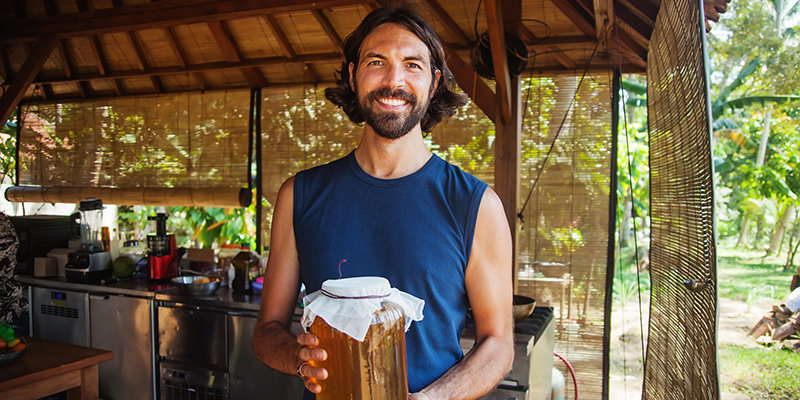
Kombucha has become all the rage in recent years, popping up across the country and hailed for its health benefits – though those benefits have not been scientifically proven. A fermented tea, Kombucha is one of America’s fastest growing drink categories, with places like Whole Foods even opening Kombucha bars inside their stores. The tea’s fermentation creates organic acids, antioxidants and vitamins that Kombucha proponents claim are the secret sauce to the drink’s health benefits. But this fermentation also creates alcohol, and in some instances much more alcohol than is labeled on the bottle, which the US Government sees as a major problem. All this means Kombucha could be facing some serious regulation very soon that could jeopardize its current ascension.
Kombucha is made by taking a bacteria culture of yeast and throwing it into a mixture of tea and sugar. Just as with making beer or wine, the yeast then eats the sugar and not only creates alcohol, but also the vitamins and acids Kombucha fans say are beneficial. Manufacturers claim that after these vital elements are created, the tea is bottled and the fermentation is complete, leaving the alcohol at its regulated level of less than one half of 1%.
The problem with Kombucha is that the fermentation can actually continue even after the tea is shipped and sitting on a shelf – seriously, bottles have exploded. This is because in order to maintain all of the nutrients inside the bottle that people crave, the tea cannot be pasteurized, as pasteurizing would not only stop the fermentation process, it would also kill all those nutrients. And killing the nutrients would defeat the point of drinking Kombucha in the first place.
This leaves the government in a bit of a predicament. In order to not be regulated by the TTB, Kombucha must contain less than a half of 1% of alcohol. But a new lawsuit alleges that Millennium Brands that make the popular GT’s Enlightened and Synergy Kombuchas have been found to have almost 3.8% alcohol inside – that’s as much as some session beers.
Regulating Kombucha would obviously be terrible for the Kombucha industry, as classifying it as alcohol would restrict where the product can be sold. So the makers of Kombucha are naturally fighting the government’s inquisition. Kombucha manufacturers claim that the process of calculating alcohol based on density – which is the government’s current practice – is flawed, as the acids inside Kombucha can weigh as much as booze, which they argue causes the test to give a false reading. There are other tests out there, similar to how alcohol is measured in blood, but these tests have not been verified by the TTB and proven to be universally accurate. Until these tests can actually be proven, it seems there could be much more Kombucha regulation on the horizon.
